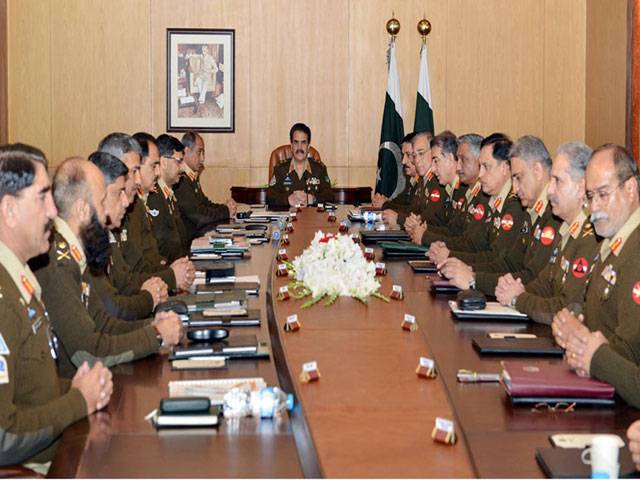ISLAMABAD - In the backdrop of unease within the troops over the sudden halt in the surgical strikes on militant targets in the northwest, the country’s top military brass met Friday in Rawalpindi to discuss professional matters at a prescheduled corps commanders meeting.
The 170th Corps Commanders Conference was held at the General Headquarters with Chief of Army Staff General Raheel Sharif in chair. It was attended by the corps commanders and ISI Director General Lieutenant General Zaheerul Islam.
A statement from ISPR termed the conference, a part of routine monthly meetings. The statement read, “The forum dwelt at length on various professional matters. The participants also under took a comprehensive review of prevalent internal and external security situation of the country.”
As the civilian government keeps pressing for peace dialogue, military analysts and intelligence sources say that it was surprising that surgical operations were halted at a time when the militant targets were being secured and the surgical operations were being executed with a successful inter-services synergy.
Last Saturday, hours after the announcement of ceasefire from Tehreek-i-Taliban Pakistan (TTP), the federal government did not stop for a second thought and ordered to stop the surgical strikes in the Federally Administered Tribal Areas (Fata). The GHQ, according to an intelligence source, had to take special permission for the surgical mission launched in Khyber Agency the next day (Sunday) in response to the militant attack on a polio team in Jamrud, which had left at least 11 dead on Saturday. At least five TTP terrorists were killed in the said air strike in Bara subdivision.
The official said, the stoppage of the surgical missions amid continuing terror activities against the civilians and the security personnel has created resentment within the rank and file of the Armed Forces in general and the Pakistan Army in particular. Purportedly, the same views were reflected in the Friday’s Corps Commanders Conference. The COAS, the official said, would brief Prime Minister Nawaz Sharif about the army’s concerns on the government’s deviation in the security strategy with regard to the Western border.
“The execution of coordinated surgical missions was the outcome of a well placed strategic integration of the two security forces, Pakistan Army and Pakistan Air Force. Disrupting a successful operation out of politically motivated reasons in the middle of execution phase dents the morale of the security men. The reckless and sweeping statements in favour of the TTP coming from the noted politicians in sheer ignorance of the ground realties add insult to injury,” he commented on Interior Minister Nisar Ali Khan’s statement made in the National Assembly on Thursday suggesting that ‘majority’ of the TTP militants was not anti-state.
Even though the government has shown interest in reviving peace talks with the TTP, the option of the use of force appears to stay very much on the cards, with more than 23,000 locals of North Waziristan Agency (NWA) who have relocated to Bannu due to surgical strikes, not being repatriated and are to be declared as Internally Displaced Persons (IDPs), in order to be officially entitled to the provisions of humanitarian assistance at an IDPs camp being set up at Kasho Bridge near Bannu.
The commanders’ meeting was held a couple of days after the army chief purportedly returned from United Arab Emirates after an all important two-day visit (Tuesday-Wednesday.) The COAS had left for the UAE reportedly to pursue negotiations on JF-17 Thunder sell-off after Saudi Arabia was said to have refused to buy the said jet fighter aircraft following its $60 billion defence deal with the United States.
However, the official attempted to detach the conduct of the commanders meeting with the army chief’s UAE visit, saying the details of Gen Raheel’s tour did not figured in the meeting and the security situation in Fata topped the agenda. “The conferences are usually held during the first week or initial days of every month. There’s nothing unusual as far as the timing of this meeting is concerned,“ he said.
Friday, April 19, 2024
Halting air strikes dents military morale
| Commanders concerned over resurgence of terrorism | Pause in surgical hits allows militants regrouping | COAS to convey army men’s resentment to PM

Caption: Halting air strikes dents military morale
SC suspends ECP’s re-polling order in PP-51
April 19, 2024
Court approves plea bargain of Parvez Elahi’s co-accused
April 19, 2024
Zardari creates another parliamentary record
April 19, 2024
KP politicians, civil society laud President’s address
April 19, 2024
A Tense Neighbourhood
April 19, 2024
Dubai Underwater
April 19, 2024
X Debate Continues
April 19, 2024
Hepatitis Challenge
April 18, 2024
IMF Predictions
April 18, 2024
Kite tragedy
April 19, 2024
Discipline dilemma
April 19, 2024
Urgent plea
April 19, 2024
Justice denied
April 18, 2024
AI dilemmas unveiled
April 18, 2024
ePaper - Nawaiwaqt
Advertisement
Nawaiwaqt Group | Copyright © 2024





